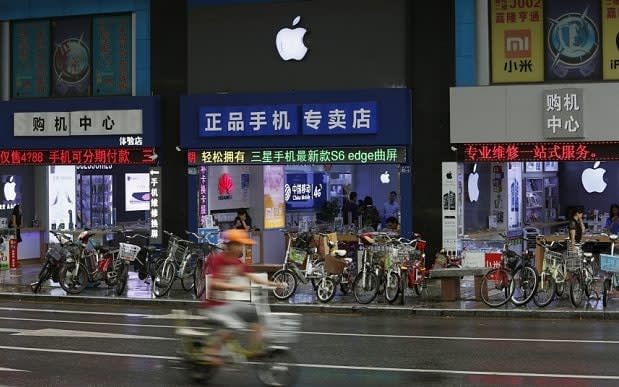Fury as Apple pulls US news app Quartz from China 'over Hong Kong coverage'

Apple has blocked a US news app from its Chinese service as the iPhone maker is accused of bowing to pressure from state censors over pro-democracy protests in Hong Kong.
Quartz, a US news site covering the Hong Kong protests, said its app was blocked from its App Store in China with a note from Apple saying it “includes content that is illegal in China”.
The ban on installing the app on iPhones or iPads prompted a furious reaction from the publisher and Quartz journalists.
“We abhor this kind of government censorship of the internet,” said Zach Seward, chief executive of New York-based Quartz.
Quartz reporter John Keefe said “Apple just took the Quartz app out of the Chinese app store at the request of China” and that the site's coverage of the Hong Kong protests “may be the reason”.
Apple did not respond to a request for comment on why it had removed the app.
On Wednesday, the company also removed a mapping app, HKmap.live, because authorities in Hong Kong claimed it was being used to coordinate protests and avoid police.
It is just the latest move by Apple to apparently appease Chinese censors amid months of pro-democracy protests and clashes in Hong Kong. Protesters are objecting to laws they see as eroding the region’s autonomy.
The app was initially blocked from being approved, since all App Store apps require the company to vet them first, but was then allowed on to the store. It was ultimately deleted again.
In an email to staff, Apple boss Tim Cook said: "On its own, this information is benign. However, over the past several days we received credible information, from the Hong Kong Cybersecurity and Technology Crime Bureau, as well as from users in Hong Kong, that the app was being used maliciously to target individual officers for violence and to victimise individuals and property where no police are present. This use put the app in violation of Hong Kong law."
Apple said: “The app displays police locations and we have verified with the Hong Kong Cybersecurity and Technology Crime Bureau that the app has been used to target and ambush police, threaten public safety and criminals have used it to victimise residents in areas where they know there is no law enforcement. This app violates our guidelines and local laws.”
The US company was the subject of a furious tirade from China’s state-backed People’s Daily, which accused the company of “letting poisonous software have its way”.
“Does this main Apple intended to be an accomplice to the rioters?” the publication said.
It is not the first time Apple has banned US news apps from its service in China. In 2017, Apple blocked the New York Times in mainland China over unspecified “violations”.
The Chinese market remains hugely important to Apple as the company battles faltering demand for its smartphones. It registered China as its third largest market in its last financial year, bringing in $44bn (£36bn).
Jim Killock, executive director of digital rights organisation Open Rights Group, said it was “reprehensible” that Apple appeared to be “doing the Chinese government’s work for them”.
“Apple should stand for democratic values and immediately reverse their decision to delete apps being used by protesters to organise,” he said.
Other US brands have also been accused of bowing to Chinese state pressure. Gaming company Blizzard banned a professional e-sports gamer over his support for Hong Kong’s protests. The US National Basketball Association saw Chinese companies sever their ties with it, apparently over a single pro-protest Tweet from one team manager.
The timing is particularly awkward for Apple, which is in the process of launching its own news app, Apple News+, around the world.
Last week, Tim Cook took to Twitter to praise student journalists at an event in Italy. “Quality journalism is crucial to all our lives, communities and wider society,” he said.
